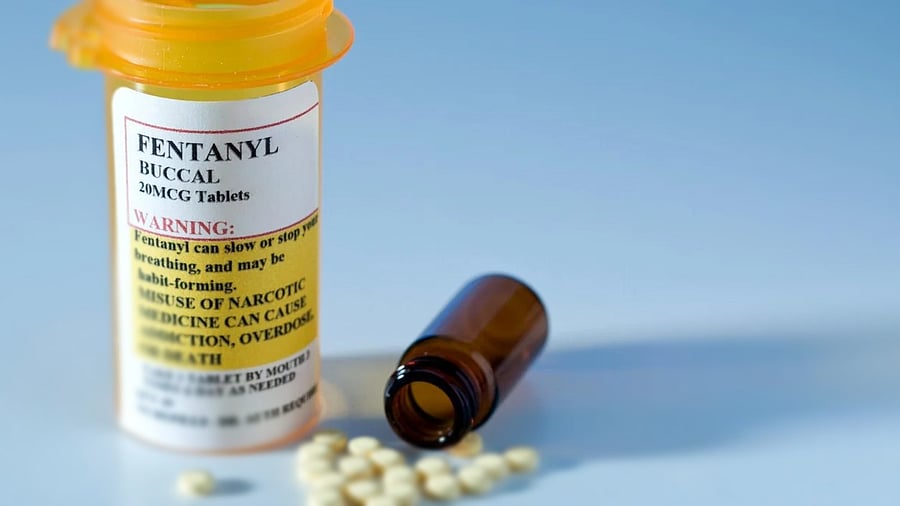
Representative image of fentanyl tablets
Credit: iStock Photo
President Donald Trump, on September 15, submitted to the United States Congress a list of 23 “major drug-transit or major illicit-drug-producing countries”. India was on the list, along with four others from its neighbourhood – Afghanistan, Pakistan, Myanmar, and China. Earlier, on March 25, the Annual Threat Assessment of the US Intelligence Community identified India, along with China, as a ‘state actor’ directly or indirectly enabling the drug traffickers.
Fentanyl, a synthetic opioid used as an analgesic and abused as a narcotic substance, has emerged as yet another irritant in the bilateral relations between New Delhi and Washington, in addition to Trump’s tariff war, his repeated claims about brokering the India-Pakistan truce on May 10 and his bonhomie with the civil and military leadership of India’s arch-rival Pakistan.
“China remains the primary source country for illicit fentanyl precursor chemicals and pill pressing equipment, followed by India,” the March 2025 report by the Directorate of National Intelligence noted. Trump pointed out in his presidential determination that his administration was deploying unprecedented resources to deal with the ‘national emergency’ created by the “trafficking of fentanyl and other deadly illicit drugs into the US”.
The US Department of Justice, on January 6, indicted Raxuter Chemicals Private Limited and Athos Chemicals Private Limited, both based in Surat, India, for criminal conspiracies to distribute and import fentanyl precursor chemicals to America. The indictment followed after the arrest of Bhavesh Lathiya, the founder of Raxuter Chemicals, in New York, following a sting operation by the US sleuths.
India’s law enforcement agencies are also doing their bit to help the US counterparts to disrupt the supply chain of the fentanyl precursors. The Anti-Terrorism Squad of Gujarat Police, on March 18, arrested Satish Sutariya and Yuka Modi, who were partners in several pharmaceutical companies based in Surat, for trying to smuggle prohibited psychotropic substances, ANPP and NPP, to Mexico and Guatemala. Sutariya is alleged to be associated with Lathiya and a major partner in Athos Chemicals. He and Modi were charged with manufacturing and distributing fentanyl precursor chemicals for unlawful export to the US. They had allegedly tried to procure 30 kg of ANPP from Balakrishna Prasad Gauda, a sales and purchase manager of Amino Organics based in Hyderabad. They had shipped four consignments to Mexico, but all were seized by the US agencies. One consignment reached an agent in Guatemala. To evade detection, they declared the consignments as “Fish Collagen Peptides” and “Vitamin B7”, the Gujarat ATS probe revealed.
Hyderabad-based Vasudha Pharma Chem Pvt Ltd came under the scanner of both the Gujarat ATS and the US agencies probing illegal smuggling of fentanyl precursors. The company’s officials, Tanweer Ahmed Mohamed Hussain Parkar, Venkata Naga Madhusudhan Raju Manthena, and Krishna Vericharla, were charged in a federal court in Washington on March 20 for manufacturing a fentanyl precursor chemical for unlawful export to the US.
The US Department of the Treasury’s Office of Foreign Assets Control (OFAC), on September 24, sanctioned Sadiq Abbas Habib Sayyed and Khizar Mohammad Iqbal Shaikh of India. They were previously indicted in the US in September 2024 on narcotics-related charges. They worked with Dominican Republic- and U.S.-based narcotics traffickers to sell counterfeit pills to Americans, as discounted, legitimate pharmaceutical products, which were instead filled with illicit drugs like fentanyl, a fentanyl analogue, and methamphetamine. They have used encrypted messaging platforms to conduct their illegal business and market their product to victims. The OFAC also designated an India-based online pharmacy for its role in “these criminal operations”.
A 2020 report by the US Drug Enforcement Administration noted that India was emerging as a source for finished fentanyl powder and fentanyl precursor chemicals.
What may worry New Delhi is that India had not been included as a source of illicit drug or precursor chemicals flowing into the US in 2023, but the 2024 Annual Threat Assessment report mentioned China as “primary source” and noted that “...Mexico-based TCOs (transnational criminal organisation) also are sourcing precursor chemicals to a lesser extent from other nations such as India.”